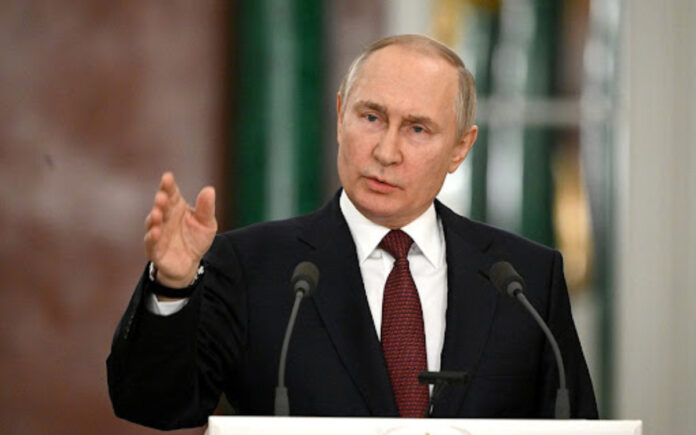Moscow: Russian President Vladimir Putin issued a fresh threat to the United States on Sunday, warning that Russia could restart the production of intermediate-range nuclear weapons if Washington proceeds with the deployment of long-range missiles in Germany.
Putin reiterated an earlier caution that Russia might resume the production of intermediate and shorter-range nuclear-capable missiles. He stated that Russia would then consider where to deploy them, following the U.S.’s decision to introduce similar missiles to Europe and Asia.
This declaration follows the U.S. announcement of its plan to deploy long-range fire capabilities in Germany by 2026, a move intended to reaffirm its commitment to NATO and European defense.
In a speech commemorating Russian Navy Day in St. Petersburg, Putin warned the U.S. of the risk of igniting a Cold War-style missile crisis with this action. “If the United States carries out such plans, we will consider ourselves liberated from the unilateral moratorium previously adopted on the deployment of medium- and short-range strike capabilities,” Putin stated.
“This situation is reminiscent of the events of the Cold War related to the deployment of American medium–range Pershing missiles in Europe,” he added.
Also Read | Khamenei Officially Endorses Masoud Pezeshkian as Iran’s President
Putin further accused Washington of escalating tensions by transferring Typhon missile systems to Denmark and the Philippines. He likened the U.S. plans to NATO’s decision to deploy Pershing II launchers in Western Europe in 1979. “The flight time to targets on our territory of such missiles, which in the future may be equipped with nuclear warheads, will be about 10 minutes,” Putin noted.
“We will take mirror measures to deploy, taking into account the actions of the United States, its satellites in Europe, and in other regions of the world,” he added.
Also Read | Philippines Accuses China of Misrepresenting South China Sea Resupply Mission Agreement
Both Washington and Moscow withdrew from the Intermediate-Range Nuclear Forces Treaty in 2019, each accusing the other of violations. Following the treaty’s dissolution, Russia had stated it would not restart production of such missiles as long as the U.S. refrained from deploying missiles abroad.
The U.S. has described its “episodic deployments” as preparatory steps for the long-term stationing of capabilities that will include SM-6, Tomahawk cruise missiles, and developmental hypersonic weapons, which possess a longer range than current capabilities in Europe, according to statements from Washington and Berlin.



